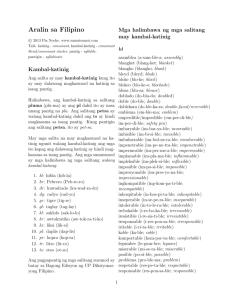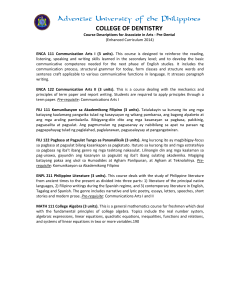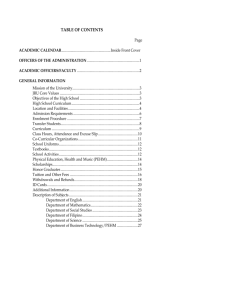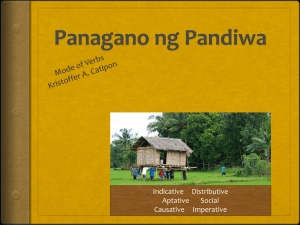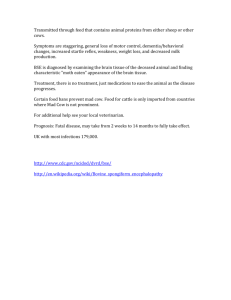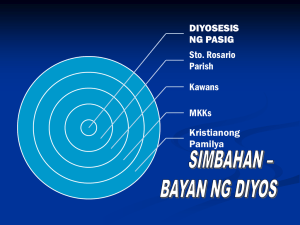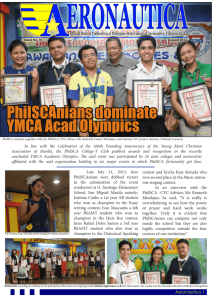high school calendar school year 2010-2011
advertisement
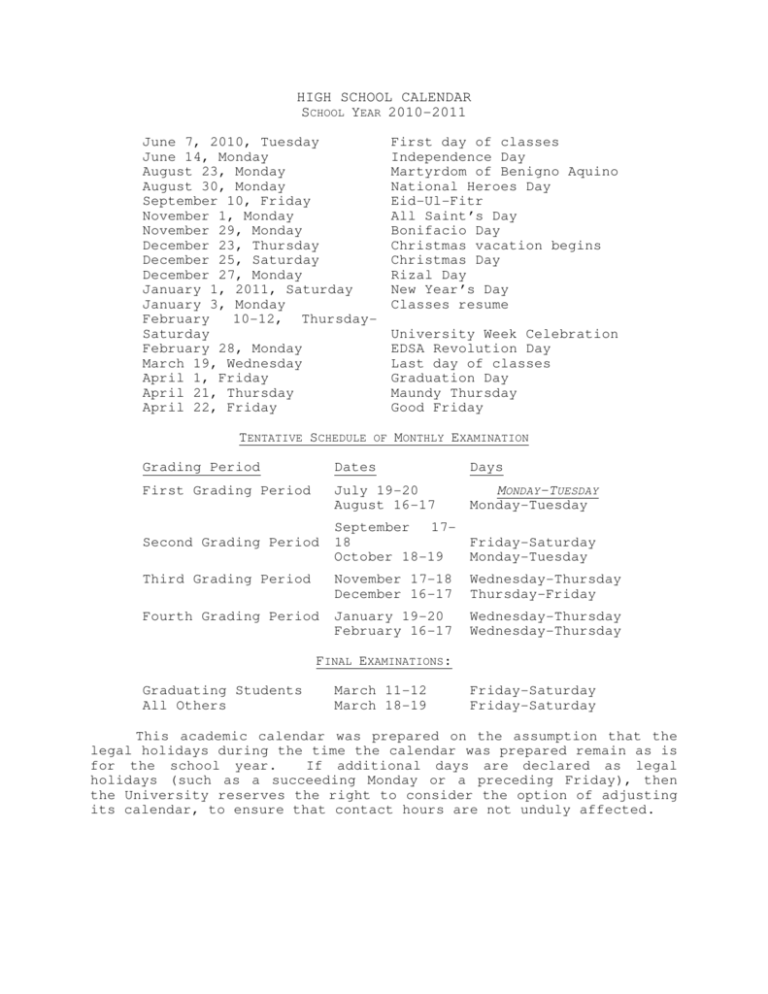
HIGH SCHOOL CALENDAR SCHOOL YEAR 2010-2011 June 7, 2010, Tuesday June 14, Monday August 23, Monday August 30, Monday September 10, Friday November 1, Monday November 29, Monday December 23, Thursday December 25, Saturday December 27, Monday January 1, 2011, Saturday January 3, Monday February 10-12, ThursdaySaturday February 28, Monday March 19, Wednesday April 1, Friday April 21, Thursday April 22, Friday First day of classes Independence Day Martyrdom of Benigno Aquino National Heroes Day Eid-Ul-Fitr All Saint’s Day Bonifacio Day Christmas vacation begins Christmas Day Rizal Day New Year’s Day Classes resume University Week Celebration EDSA Revolution Day Last day of classes Graduation Day Maundy Thursday Good Friday TENTATIVE SCHEDULE OF MONTHLY EXAMINATION Grading Period Dates Days First Grading Period July 19-20 August 16-17 MONDAY-TUESDAY Monday-Tuesday Second Grading Period September 1718 Friday-Saturday October 18-19 Monday-Tuesday Third Grading Period November 17-18 December 16-17 Wednesday-Thursday Thursday-Friday Fourth Grading Period January 19-20 February 16-17 Wednesday-Thursday Wednesday-Thursday FINAL EXAMINATIONS: Graduating Students All Others March 11-12 March 18-19 Friday-Saturday Friday-Saturday This academic calendar was prepared on the assumption that the legal holidays during the time the calendar was prepared remain as is for the school year. If additional days are declared as legal holidays (such as a succeeding Monday or a preceding Friday), then the University reserves the right to consider the option of adjusting its calendar, to ensure that contact hours are not unduly affected. Page 1 GENERAL INFORMATION Jose Rizal University is a non-stock, non-profit, nonsectarian private Philippine educational institution, which was founded in 1919 by Vicente Fabella, the first Filipino certified public accountant. The University offers courses of study at the elementary, high school, collegiate, law and graduate levels. Its course offerings for the elementary and secondary levels are recognized by the Department of Education (DepEd), and the Commission on Higher Education (CHED) for the tertiary levels. MISSION OF THE UNIVERSITY Jose Rizal University aims to develop its students to become useful and responsible citizens through the effective transfer of relevant knowledge and desirable values. JRU CORE VALUES Our core values define how we behave individually and collectively, as inspired by the ideals of the founder. A Rizalian is: Responsible. A team player who is focused, attentive, gives one’s best and is committed to the goals of the University. Considerate and Courteous. A fair and caring person fully aware of other’s rights, feelings and ideals. With Integrity. ethically. OBJECTIVES OF THE A person who acts truthfully, morally and HIGH SCHOOL The primary objectives of JRU High School are (1) to teach a secondary education curriculum that will prepare the students for adult life, with emphasis on the development of communication and computational skills as well as the reasoning prowess; (2) to inculcate the concept of representative government, national sovereignty, and the Filipino way of life, (3) to develop vocational and technological efficiency; and (4) to develop the desirable traits of integrity, self-discipline, diligence and the work ethics, intellectual curiosity, and love of God and country. HIGH SCHOOL CURRICULUM The High School offers the four-year secondary curriculum for day students, as approved by the Department of Education (DepEd), and as modified to suit the global educational policies and priorities of JRU High School. High school classes are conducted for 80 minutes each for English, Math, Science and Business Technology 3 and 4 and 40 minutes each for the rest of other subjects. Page 2 English is used as the medium of instruction in all subjects except Filipino. It is the University’s belief that complete familiarity with the English language is critical to a more effective social and economic role of the child. The High School is very conscious of the importance of a good command of the English language in secondary education, and has taken the option of shortening the four years of Values Education into the first two years and devoting the class time saved into additional English subjects. In addition, the High School Division initiated steps in improving our subjects by including the Computer Aided Instruction (CAI) in teaching all our subjects. A separate five-year evening high school course is offered, primarily designed for working students and others who are unable to study during the daytime. Evening high school students are normally required to take Vocational subjects and Physical Education, Health and Music (PEHM) although the requirement may be waived for working students. Graduating evening high school students are required to take Citizenship Advancement Training (CAT). LOCATION AND FACILITIES Jose Rizal University is located at 80 Shaw Boulevard, Mandaluyong City, occupying an area of one and a half city blocks. It is accessible through public transport passing directly in front of and around the school. It is located on high ground and completely surrounded by concrete walls. Located inside the spacious campus are modern, well-ventilated, reinforced concrete multi-storey buildings. The air-conditioned University library contains a wide selection of books and periodicals as well as a variety of supplementary reading materials. The reading room, separate from the library book stacks, provides the proper atmosphere for study and research. The library collection contains more than 70,000 titles and is still increasing. Another five-storey building houses the science, computer and speech laboratory rooms and the air-conditioned auditorium. The computer classrooms contain 56-position computer facilities, which are more than adequate for every student in each classroom. The University has a modern speech laboratory designed to facilitate good and efficient communication systems between the teacher and the students, thus providing a modern way of employing the “Listen and Learn” principle. The audio-visual room has ample space for faculty and students. It is equipped with a 28-inch colored television set, a VHS, optic cart, overhead and slide projectors, as well as other equipment. Page 3 The new high school building (Building M) houses the modern laboratories and spacious library. The school cafeteria provides hot and nutritious meals at reasonable prices, in addition to snacks and refreshments. The University Bookstore has a complete stock of the required textbooks, school uniforms, and school supplies offered at reasonable prices. However, students may, if they so prefer, obtain their textbooks and other school supplies elsewhere. Professional guidance counseling is available at the Guidance and Testing Office for individual or group counseling for academic and/or personal problems. Individual and group testing are also available upon request. Any high school student may request for an appointment with the guidance counselor. A physician, dentist, and nurse are on duty during school hours at the Medical and Dental Clinic. Students are given a physical check-up during the school year, and any defect or infirmity is immediately reported and acted upon as appropriate. The University has an air-conditioned ecumenical prayer room where students are welcome to pray. The athletics and physical education facilities are located at the new Gym Building (Bldg G) - Annex Campus 3 where students can enjoy playing basketball and other indoor sports. ADMISSION REQUIREMENTS New students interested to enroll at the high school division should submit an Application for Admission (JRU Form 1), properly filled out, together with his Report Card (Form 138) or other entrance credentials. Application forms may be obtained at the Office of the High School Principal, in Room M-101. A new student seeking admission to the High School must have obtained satisfactory grades in deportment. In the absence of any school record which may serve as a basis for admission, the applicant may submit a certified statement signed by the principal of the school last attended about the loss of school records indicating the subjects passed; or the guardian of the applicant may sign a waiver form acceptable for temporary enrolment and available at the Office of the High School Principal indicating therein a commitment date when to submit the student’s official school record. A student who receives not more than three failing grades at the end of the school year should enroll during the summer term to make up for his deficiencies; otherwise, he will either be required to repeat the curriculum year in which he has been enrolled, or will be allowed to take only the subjects which he has failed. Page 4 Married students are not admitted for enrollment in the day session, but may be admitted in the evening session. A foreign student should bring his Alien Certificate of Registration upon enrolment, as well as the approval for enrolment and the evaluation of units earned abroad as certified by the Department of Education. A working student is required to submit a certificate of employment upon enrollment in the evening classes. A selfemployed student should submit a certification from his guardian. A non-working student below 16 years of age must submit a written note of consent from his parent indicating a justifiable reason for allowing him to enroll in the evening. Jose Rizal University High School reserves the right to decline any application, which does not conform to its admission policies. All students are subject to the policies, rules and regulations of the school and are bound, among others, by the provisions and representations made in this announcement. However, such stipulations shall not be considered as constituting an irrevocable contract between the student and the school as it is understood that the school reserves the right to modify, change, alter or revise them. Classes begin on Monday June 7, 2010. The preferential dates of registration are as follows: Fourth year old day and May 3 evening, and fifth year evening First year old and new day May 4 and evening Second year old day and May 5 evening Third year old day and May 6 evening Transfer students and open May 7enrolment onwards Students enroling after these preferential dates are not assured of enrolment due to space constraints, hence, they are advised to come as scheduled to avoid non-admission or closed preferred sections. For further information concerning admission, please see the Principal or Assistant Principal in Room M-101, which is open from 7:30 in the morning to 6:00 o’clock in the afternoon from Mondays through Saturdays. Telephone Nos. : 531-8031 to 35 Fax No. : 531-6087 Email : highschool@jru.edu Website : www.jru.edu Page 5 ENROLMENT PROCEDURE Generally, the enrollee is required to present his enrolment credentials to the teacher in charge of registration in accordance with the specific curriculum year as indicated on the bulletin board and in detailed enrolment guidelines available in the Office of the High School Principal. Upon approval of the credentials and accomplishment of registration forms, the enroler enters the subjects the students should take, his section and schedule. Students availing of discounts/ scholarships must proceed to the Student Accounts Office (for application and approval) before payment. The student then goes to the teller for payment in Room A-21 presents the enrolment permit and makes the necessary payment. The amount printed in the official receipt should tally with the actual payment. Keep in mind that preliminary registration and payment of fees should be done on the same day to be assured of space in the subjects enrolled, otherwise, reservations may be cancelled. A student is considered officially enrolled only after: (1) the tuition fee for at least two months plus; and (2) all pertinent miscellaneous fees have been paid, as evidenced by a validated Official Receipt. The admission card is evidence of the student’s enrollment and should be presented to the subject teachers for their signatures on the first day of classes. The card should be kept with care as proof of his official enrolment in the University. TRANSFER STUDENTS The minimum residence requirement for graduation from the High School of Jose Rizal University is two curriculum years. In the day session, the University admits transfer students only up to third year. In the evening session, transfer students are considered for admission only up to the fourth year of the fiveyear High School evening curriculum. Cases involving transferees other than those mentioned above will be considered on a case-tocase basis. Application should be made with the High School Principal. CURRICULUM The JRU High School Curricula for all curriculum years meet the national requirements but are further strengthened to enhance instruction reflective of the knowledge, skills and attitudes suited to the ever-changing needs of students and society. In terms of the number of contact hours, the JRU HS curricula offer more compared to DepEd’s Basic Education Curriculum. Year Level Total Number of Minutes per Day JRU Curriculum BEC of DepEd Page 6 I II III IV 440 440 440 440 418 418 418 430 CURRICULUM - DAY SESSION FIRST YEAR Subjects Unit Perio s ds English 11 (Grammar & Composition) 1 1 English 12 (Reading/Literature I) 1 1 Filipino 11 (Wika at Panitikan 1/Ang 1 1 Kataliningan ni Rizal) 1 1 Social Studies 11 (Phil. History & Government) Mathematics 01 (Elem Algebra w/Gen Math 2 2 as Introduction) Science & Technology 11 (General 2 2 Science) Business Technology 01 (Technology& 1 Home Economics) 1 Values Education 11 1 1 PEHM 1 (Physical Education, Health (1) (1) and Music) TOTAL 10 10 Page 7 SECOND YEAR Units Perio ds English 21 (Grammar & Composition) 1 1 English 22 (Speech & Pub. 1 1 Speaking/Literature 2) Filipino 21 (Wika at 1 1 Panitikan/Florante at Laura) Social Studies 21 (Asian History) 1 1 Science & Technology 21 (Biology) 2 2 Mathematics 02 (Intermediate Algebra 2 2 & Statistics) Business Technology 2 (Micro-Text 1.5 1.5 Processing) Values Education 21 1 1 PEHM 2 (Physical Education, Health (1) (1) and Music) TOTAL 10.5 10.5 Subjects THIRD YEAR Units Period s English 31 (Grammar & Composition) 1 1 English 33 (Literature 3) 1 1 Filipino 31 (Wika at Panitikan/Noli 1 1 Me Tangere) Social Studies 31 (World History) 1 1 Science & Technology 31 (Chemistry) 2 2 Subjects Mathematics 33 (Advanced Algebra) 1 Mathematics 34 (Trigonometry) 1 Business Technology 3 (Comp. Science) 1.5 PEHM 3 (Physical Education, Health (1) and Music) TOTAL 10.5 1 1 1.5 (1) 10.5 FOURTH YEAR Units Period s English 41 (Grammar & Composition) 1 1 English 43 (Journalism/Literature 4) 1 1 Filipino 41 (Wika at Panitikan 4/El 1 1 Filibusterismo) Social Studies 41 (Economics) 1 1 Science & Technology 41 (Physics) 2 2 Mathematics 43 (Statistics) 1 1 Mathematics 44 (Calculus) 1 1 Business Technology 4(Basic 1.5 1.5 Acc./Electronic Spreadsheets) PEHM 4 (Physical Education, Health (1) (1) and Music) TOTAL 10.5 10.5 Subjects Page 8 CURRICULUM -EVENING SESSION FIRST YEAR Units Period s English 11 (Grammar & Composition) 1 1 Subjects Filipino 11 (Wika at Panitikan 1/Ang 1 1 Kataliningan ni Rizal) Social Studies 11 (Phil. History & 1 1 Government) Mathematics 11 (General Mathematics) 1 1 Science & Technology 11 (General 2 2 Science) Business Technology 1 (Technology (1.5 and Home Economics) ) (1.5) PEHM 1 (Physical Education, Health and Music) (1) (1) TOTAL 6 6 SECOND YEAR Unit Period s s English 21 (Grammar & Composition) 1 1 Filipino 21 (Wika at 1 1 Panitikan/Florante at Laura) Mathematics 21 (Elementary Algebra) 1 1 Subjects Science & Technology 21 (Biology) 2 2 Values Education 11 (Values Educ. 1) 1 1 Business Technology 2 (Micro-Text (1.5) Processing) (1.5) PEHM 2 (Physical Education, Health (2) (1) and Music) TOTAL 6 6 THIRD YEAR Units Perio ds English 31 (Grammar & Composition) 1 1 Filipino 31 (Wika at Panitikan/Noli 1 1 Me Tangere) Mathematics 22 (Geometry) 1 1 Science & Technology 31 (Chemistry) 2 2 Subjects Values Education 21 (Values Educ. 2) 1 1 Business Technology 3 (Computer (1.5) Science) (1.5) PEHM 3 (Physical Education, Health (1) and Music) (1) TOTAL 6 6 Page 9 FOURTH YEAR Subjects Units Period s English 41 (Grammar & Composition) 1 1 English 22 (Speech/Public Speaking) 1 1 Mathematics 31 (Statistics) 1 1 Mathematics 41 (Advanced Algebra) 1 1 Social Studies 21 (Asian History) 1 1 Social Studies 31 (World History) 1 1 Business Technology 4 (Basic (1.5) Acc/Elec. Spreadsheets) (1.5) PEHM 4 (Physical Education, Health (1) and Music) (1) TOTAL 6 6 FIFTH YEAR Units Period s Science & Technology 41 (Physics) 2 2 Filipino 41 (Wika at Panitikan/El 1 1 Filibusterismo) Mathematics 42 (Trigonometry) 1 1 English 43 (Journalism/Literature 4) 1 1 Social Studies 41 (Economics) 1 1 PEHM 4 (Physical Education, Health (1) and Music) (1) TOTAL 6 6 Subjects Day fourth and evening fifth year students are required to see their section advisers before the end of June 2007 for the re-evaluation of their subjects required for graduation; failure to do so may cause the students to be ineligible for graduation. Working students in the evening session who have submitted their certification of employment are given credit in PEHM and THE. CLASS HOURS, ATTENDANCE AND EXCUSE SLIPS Day session classes are conducted from 7:00 o’clock in the morning to 5:40 o’clock in the afternoon on regular school days, with appropriate study and snack/lunch breaks. Every Monday morning, students with first-period classes are required to come fifteen minutes earlier to participate in the flag-raising ceremony. From Tuesday through Fridays, students sing the National Anthem and recite the Filipino Patriotic Pledge before starting their first period classes. Evening session classes are held from 5:00 o’clock in the afternoon to 9:00 o’clock in the evening. Evening high school students have a regular load of six academic periods during the school year. Page 10 High School students are not allowed to go out of the campus from 7:00 o’clock in the morning until their last period in the morning or afternoon. Punctual attendance is required of all students. Students who come to class later than five minutes after the ringing of the bell will be allowed to enter the classrooms only with an excuse slip from the Office of the Principal. Three consecutive days tardiness are counted as one unexcused absence. A student who has incurred absences, excused and/or unexcused, equivalent to twenty per cent (20%) of the prescribed DepEd number of school days for the school year may not be given credit for the particular subjects. After one or two consecutive absences, a student is required to present to the teacher concerned a letter of excuse written and signed by the parent, together with his ID card or residence certificate. If a student is absent for more than two consecutive days, the letter of the parent with the same requirement should be submitted to the Principal or Assistant Principal to obtain an official excuse slip for re-admission to his classes. Excuse slips are issued at the Office of the Principal during the first three periods of every session. The parent should immediately notify the Principal, if a student is sick. A student who is absent for one week or more can be re-admitted only when accompanied by the parent in securing the excuse slip from the Principal. CO-CURRICULAR ORGANIZATIONS Co-curricular organizations related to different subject areas are organized to enhance the interest of the students in related subjects, to improve their skills in various fields, and to promote harmonious social relationship in the school campus. Organizations correlated with other curricular areas provide the students enriching learning experiences. Another objective of these organizations is to foster orderliness and cleanliness in the school environment. During class hours the officers and members see to it that corridors are free of loitering students and monitor the orderly movement of students along the stairways and corridors. Close coordination is maintained between the Mandaluyong City and civic officials, and the students and faculty on community-related activities. SCHOOL UNIFORMS Day session students are required to wear the school uniform while in school. Those who are not in uniform are not admitted to their classes, instead they are advised by their subject teachers to stay in the library until their dismissal time, to accomplish Page 11 any class work they may have missed. requirement for evening session students. There is no uniform The prescribed JRU High School uniform for girls consists of a white blouse with JRU monogram sewn over the left breast pocket, and the JRU-striped white, blue and gold skirt. For boys, the prescribed uniform is a white polo shirt with the JRU monogram sewn on the left breast pocket of the shirt, and long black trousers. The pattern, prescribed items and clothing materials are available at the JRU Bookstore. Both male and female students are required to wear black shoes and white socks. The prescribed PEHM uniform for both boys and girls are a special white round-neck T-shirt obtainable from the Bookstore. Boys may wear any dark shorts, while girls wear their striped skirts during ordinary P. E. or jogging pants during games. Page 12 TEXTBOOKS All high school students are required to obtain a complete set of the prescribed textbooks, the lists of which are posted outside the Bookstore. The University Bookstore sells textbooks and school supplies at reasonable and competitive prices, but students are free to obtain their textbooks and school supplies elsewhere, if they so prefer. SCHOOL ACTIVITIES To supplement classroom work, actual field excursions and educational tours with parental consent and under the supervised direction of class advisers are undertaken by the students in all curriculum year levels. Instructional techniques are supplemented by a variety of audio-visual materials housed in a separate audio-visual room. The student body of the high school publishes a high school student organ, The Scroll, completely managed and edited by the students. Students are encouraged to write and publish original articles in this school organ. They are given the opportunity to express themselves freely through writing. Managing the school paper imbues the students’ minds with the significance of responsibility and work, and plays an important role in the development of a mature studentry. A yearbook, The Blue and Gold, is a project of, and published annually by, the seniors. Quiz shows in all subject areas are held to reinforce the learning acquired in classrooms and enhance mental alertness. The University has units of the Boy Scouts and the Girl Scouts of the Philippines. The scouts activities are highlighted by an annual hiking and camping under the supervision of responsible scoutmaster-faculty members. Boy and girl scouts participate actively in the University community programs. The High School has an active Student Catholic action unit. Holy Mass is celebrated every first Friday of the month at the school campus. Religious instruction is conducted on a voluntary arrangement to interested Catholic students. The prayer room in Room C-14 is open during schools hours, where the students of all denominations may meditate. Literary and musical programs, convocations featuring noted resources persons, and other social gatherings are frequently held at the campus for further educational and cultural enrichment. The homeroom provides an opportunity for closer teacherstudent relationship, more effective practice of social group living, and better group guidance activities. Page 13 Complete computer facilities are provided for the student’s hands-on experience to reinforce the lessons learned in ordinary classrooms. Study activities in Mathematics, Science and English are conducted by academic organizations before monthly examinations to help students who have inadequate skills in the 3 subjects without any financial obligation on their part. PHYSICAL EDUCATION, HEALTH AND MUSIC (PEHM) PEHM (Physical Education, Health and Music) is offered to the first, second, third year and fourth year students and includes physical and health education, scouting and music. The annual intramural league is an important component of the physical education program. It is designed to encourage as many students as possible to participate in a competitive manner in several group sports. For their own protection, students who participate are required to secure inexpensive student insurance during the season. Jose Rizal University is a member of the National Collegiate Athletic Association (NCAA), and high school students are given the opportunity to enjoy the benefits of its membership. Qualified students are encouraged to participate in the NCAA Junior Division sports of basketball, chess, football, softball, swimming, tennis, track and field, and volleyball. The three-day University Week Celebration held in February is a significant event in the school with maximum student participation as a major objective. It features art exhibits, literary and musical programs, field demonstrations, parlor games, quiz shows and other activities; thus enhancing the students varied interests and talents. SCHOLARSHIPS To encourage deserving students to enrol and finish their studies at JRU, La Pluma and Academic Scholarships are made available to valedictorians, salutatorians, first to third honorable mention graduates from any public or private elementary schools recognized by the government. Incoming 2nd to 4th year JRU High School students may likewise qualify for academic scholarships. These scholarships can only be availed of, if the students enroll during the school year immediately following their graduation. JRU Elementary graduates enrolling in the High School are given a reduction of ten percent (10%) provided they enroll in the school year immediately following their graduation. The editor-in-chief and the managing editor of the high school publication, The Scroll, are entitled to full and half Page 14 scholarships valid for one year respectively. Likewise, the male and the female CAT Corps Commanders are entitled to full scholarships valid for one school year. Scholarships are also awarded to band members and deserving athletes and cheerleaders. Several scholarships, including stipends, are awarded to deserving students under the sponsorship of Jose Rizal University Alumni Association (JRUAA). Further information on this matter may be obtained from the High School Principal. Page 15 HONOR GRADUATES Basically, a graduating student with normal study load who obtains a final general average of 85% or above, with no quarterly and final grade lower than 80% in any subject is considered qualified for inclusion in the honors list. The final general average of the student in the third and fourth year is computed to obtain the average, which becomes the basis of determining his rank in the list of honors. A candidate for graduation honors must have met the minimum two-year residence requirement. Furthermore, a student who is aspiring to become a valedictorian or salutatorian should not obtain any quarterly and final grade lower than 80% in any subject during his two years of schooling in the high school. FEES The tuition fee (Cash basis) of each individual student will depend upon the number of academic and vocational periods he/she is taking: One period P 4,320.00 Two periods 5,800.00 Three periods 7,810.00 Four periods 9,570.00 Five periods 11,740.00 Six periods 13,480.00 Seven periods 14,700.00 Eight periods 16,320.00 Nine periods 18,080.00 Ten periods (regular load for all 4 years) Eleven periods 19,430.00 Twelve periods 19,570.00 Thirteen periods 19,700.00 18,540.00 Discounts are granted for cash payment of the tuition fees for the entire school year and to regular students with brothers and/or sisters enrolled in the University. However, no discounts in tuition fee for brothers and/or sister will be enjoyed by students if said fees are not fully paid by March 16, 2010. If a brother or sister withdraws during the school year, tuition fees of the remaining brothers and/or sisters studying at Jose Rizal University will be adjusted accordingly. Both academic and vocational periods computing the pertinent tuition fees. are included in Please note that effective SY 09-10, students with delinquent accounts shall be subject to penalties. These include those students who do not settle their financial obligations to the Page 16 University on time, including those student with financial delinquencies who do not secure their examination permits. Students with regular loads plus another PEHM period presumably because of unsatisfactory performance in PEHM during the preceding school year, will be charged for the school load as a single period. The PEHM period of a student carrying a load less than the normal load is charged as a period. Other fees which may be charged for the school year, include the following: Auxiliary student services P 210.00 Co-curricular activities 1,000.00 Development Fee (all) 1,330.00 Energy fee 1,790.00 FSA (foreign students only) 15,000.00 Graduation fee (for graduating students only) ID, research and testing fee 340.00 ID revalidation 100.00 Late enrolment fine 700.00 Library fee (all) 560.00 Lost card replacement 160.00 850.00 Laboratory General Science Earth Science Biology Chemistry Physics Computer Science laboratory 890.00 Speech laboratory fee (II Yr.) 480.00 480.00 480.00 480.00 480.00 fee (all per period) 810.00 The last day of enrollment without a late enrollment fine is the first day of regular classes, which is Monday, June 7, 2010. Any student who enrols after the said date shall be considered as late enrolee and will be subject to fine. ID CARDS Student identification cards (IDs) are issued at the beginning of the school year. The IDs should always be attached to the shirt or blouse of a student while in school. Presentation of the ID card is required, among others, when entering and leaving the campus, borrowing athletics equipment, securing examination slips, availing of medical/dental services, and applying for the use of school facilities. Students should be careful with their ID’s as any student who loses his identification card pays a replacement fee before he is issued another one. They can obtain temporary gate passes only pending recovery/replacement of lost ID, if they are accompanied to the office by their parents. Temporary gate passes are good for a duration of one (1) week only. Page 17 WITHDRAWALS AND REFUNDS Tuition fees may be refunded to students who withdraw under certain circumstances. However, all pertinent miscellaneous fees are charged in full and are not refundable under any circumstance. A distinction is made between students who withdraw within the 30-day period after the beginning of classes and beyond. Withdrawals are made after the beginning of classes provided the Principal is notified promptly by the parent or guardian, and the request is approved by both the High School Principal and the Vice President for Finance. Refunds will be made if the corresponding charges have been paid within the 30day limit. Forms of withdrawal are available in the Office of the High School Principal. If the withdrawal is approved after 30 days of the beginning of classes, the student is charged in full for the entire school year. If the student is considered dropped the student is also charged in full for the school year regardless of actual attendance. When tuition fees are paid in full for the refunds are allowed under the following conditions: whole year, (1) The whole cash tuition fee, minus P50.00, if the student is withdrawn before the beginning of the school year; (2) Eighty percent of the total cash tuition, if the student is withdrawn seven days after the beginning of classes; (3) Fifty percent of the total cash tuition fee, if the student is withdrawn within thirty days after the beginning of classes; (4) The entire cash tuition fee is charged for the year, if the student is withdrawn more than thirty days after the beginning of classes regardless of actual attendance. When tuition fees are paid on the installment basis, the following conditions will govern refunds: of the tuition fee paid minus P50.00, if student is withdrawn before the beginning of classes; (1) Refund the (2) Twenty percent of the total tuition will be charged, if the student is withdrawn beginning of classes; within seven days after the (3) Fifty percent of the whole year’s tuition fee will be charged, if the student is withdrawn within 30 days after the beginning of classes, the attendance of the pupil notwithstanding; (4) The entire tuition fee will be charged for the year, if the request is made more than 30 days after the beginning of classes, regardless of actual attendance. Page 18 ADDITIONAL INFORMATION Further information may be obtained from the Office of the High School Principal, Room M-101, which is open from 7 o’clock in the morning to 9 o’clock in the evening from Mondays through Fridays. The telephone numbers of the University are 531-80-31 to 531-80-35, the Office of the High School Principal can be reached through Local 18. Fax No. : 531-6087 Email : highschool@jru.edu Website : www.jru.edu Page 19 DESCRIPTION OF SUBJECTS DEPARTMENT OF ENGLISH ENGLISH 11: Grammar and Composition I. This subject is designed for the student to: a) understand the functions and syntax of parts of speech; (b) gain communicative competence through the improvement of basic learning skills (LSRW); and (c) apply subject-verb agreement. ENGLISH 12: Reading/Literature I. The subject takes freshmen into the world of adolescence. The selections lead to the understanding of the many facts of personality and enable possible answers to the expressed questions and doubts which adolescents usually experience. ENGLISH 21. Grammar and Composition II. This deals more on word formation changing sentence form using voice, applying appropriate expressions; proper sequencing of words in sentences and the reinforcement of LSRW. ENGLISH 22. Speech and Public Speaking/Literature II. The subject deals on the diverse cultures, lifestyles, customs, traditions and ways of our Afro-Asian brothers and sisters which help students recognize the differences and beliefs and the similarities as well. This is expressed by way of enhancing their speaking skills as to – stress, diction, phrasing etc. ENGLISH 31. Grammar and Composition III. This subject tackles verbals – formation and function, the use of Perfect Tenses and its development and expansion of sentences using modifiers. ENGLISH 33. Literature III. The subject brings selections of great American and English writers that invite learners to communicate more deeply with themselves; thus, provide insights to help achieve their goals in preparation for greater tasks and more matured roles. ENGLISH 41. Grammar and Composition IV. This subject is designed to: a) further develop communication skills through a thorough and functional approach to grammar with particular stress on the effectiveness; b) identify phrases, clauses and sentences; and c) recognize as well as construct sentences with parallel structures. Prerequisite: applied in all year levels. ENGLISH 43. Literature 4. The subject presents texts of the famous world writers using the chronological approach based on historical periods. This helps students view and appreciate the monumental sweep of the intellectual, cultural – artistic development of human thought and expression as revealed in literature. Page 20 DEPARTMENT OF MATHEMATICS MATHEMATICS 01. Elementary Algebra with General Mathematics as Introduction (formerly Math 13). This course deals with the study of Hindu-Arabic system of numeration, four fundamental operations on whole numbers, fractions and decimals, ratio and proportion, percentages, the study of integers, algebraic expressions, equations in one variable, inequalities, factoring and special products, linear equations and rational expressions. MATHEMATICS 02. Intermediate Algebra and Statistics. This course includes the study of real numbers, algebraic expressions, rational expressions, functions and relations, linear operations and function, system of linear equation, special products and factoring and quadratic equations. The course is a continuation of elementary algebra, factoring quadratic equations, binomial theorem, simultaneous equations of three or more unknown of the second or higher degrees, graphical solutions of simultaneous equations and complex numbers. In addition, students are also introduced to the study of statistiscs where the study of characteristics and sources of data, frequency distribution, graphical representation of data and others are highlighted. MATHEMATICS 33. Advanced Algebra. The course is a continuation of elementary algebra, factoring quadratic equations, binomial theorem, simultaneous equations of three or more unknown of the second or higher degrees, graphical solutions of simultaneous equations and complex numbers. MATHEMATICS 34. Trigonometry. This course covers such topics as generalized trigonometric functions, fundamental trigonometric functions, solution of right triangles and application of trigonometric functions. MATHEMATICS 43. Statistics. This is the study of characteristics and sources of data, frequency distribution, graphical representation of data, measurement of central tendency, dispersion and skewness and theory of probability. MATHEMATICS 44. Calculus. This course covers relations and functions. It also consists of limits and continuity, derivative, maxima and minima of algebraic functions and of indefinite and definite integrals with applications. DEPARTMENT OF SOCIAL STUDIES SOCIAL STUDIES 11. Philippine History and Government. The subject is a study of Philippine History from pre-Spanish times to contemporary events with due emphasis on our own civilization, law and government. It also gives a comparison and contrast of our historical and cultural heritage from our forbearers to our colonial masters. Page 21 SOCIAL STUDIES 21. Asian History. The subject provides a historical and cultural background of the different oriental countries. It also gives an impact on Western colonization leading to nationalist and socialist movements and ultimately the struggle to independence. SOCIAL STUDIES 31. World History. The subject provides a vast array of information and history and heritage of people and races. It covers a panoramic view of world events with emphasis on human race. SOCIAL STUDIES 41. Economics. The subject deals with the study of main principles, theories and truths of the complexities of economic life at the international, national, regional community and household levels. It also continues our tradition of looking at economic issues from the viewpoint of total human development. VALUES EDUCATION 11. The subject deals on how man lives with others in a social environment, on what he has as a man and to be able to make use of these abilities and potentials for his welfare and that of others. It helps an individual to take a close look at this self-image and decide what to do. VALUES EDUCATION 21. The subject provides the learning experiences which will guide him as he journey to know more about himself and discover how harmony with people in the society in which he lives DEPARTMENT OF student varied continues his he can live in in. FILIPINO FILIPINO 11. Wika at Panitikan 1/Ang Kataliningan ni Rizal. Sa paglalahad ng mga aralin ay pinaghihiwalay ang pampanitikan at pangwika. Ang mga aralin sa panitikan ay ang mga sumusunod: pabula, epiko, maikling kuwento, anekdota, kawikaan, salawikain, alamat, tula at talambuhay. Saklaw rin nito “Ang Kataliningan ni Rizal” bilang pagpapahalaga sa ating pambansang bayani. Ang mga akda ay kinasasalaminan ng mga ginintuang aral, pagpapahalagang pangkatauhan para sa paglinang ng kaasalan at isipan ng mga magaaral. Kabilang din ang malikhaing gawain para sa katapusan ng bawat aralin at ang pagpapalawak ng talasalitaan. Sa mga araling pangwika ay ang mga sumusunod: Makabagong ortograpiyang Pilipino, Pangungusap, Parirala, iba’t ibang bahagi ng pananalita; pangngalan, panghalip, pandiwa, pandamdam, pangatnig, pang-uri, pang-abay at pang-ukol. Palabuuan ng mga salita at pagsulat ng komposisyon. FILIPINO 21. Wika at Panitikan/Florante at Laura. Ang pagaaral nito ay nauuri sa dalawang bahagi, ang pampanitikan at pangwika. Ang mga aralin sa panitikan ay ang mga sumusunod: tula, maikling kwento, sanaysay, alamat, talambuhay, dula, talumpati, pabula at Florante at Laura. Kabilang ang pagpapalawak ng talasalitaan. Sa bawat katapusan ng aralin ay ang paglalahad ng Page 22 aral at pagpapahalagang pangkatauhan na siyang huhubog sa katauhan ng mga mag-aaral. Sa mga araling pangwika, binibigyang diin ang mga sumusunod: wastong gamit ng mga salita, pagkilala sa salita, parirala at sugnay, paglikha ng liham-pangkaibigan. Iba’t ibang bahagi ng pananalita; pangngalan, pang-uri, pangatnig, pandiwa at pang-abay, porpolohiya at mga uri ng pagpapahayag; pagsasalaysay, paglalarawan at paglalahad, paglikha ng komposisyon at mga pagsasanay sa kayariang pangwika. FILIPINO 31. Wika at Panitikan/Noli Me Tangere. Ang mga tinatalakay ay ang pangngalan, panghalip, pang-uri, pang-abay, pandiwa, pandiwari, pang-ukol, pangatnig at pang-angkop. Sa pamamagitan ng mga ito, inaasahang ang mga mag-aaral ay mapaguuriuri ang mga parirala, sugnay at pangungusap. Ang mga uri ng akdang pampanitikan na tinatalakay ay ang mga tula, sanaysay, maikling kuwento at nobelang isinulat ni Dr. Jose Rizal, ang “Noli Me Tangere.” Ang mga akdang tinatalakay ay nililinang sa pamamagitan ng mga sumusunod na Gawain: “Payamanin ang Talasalitaan”, “Kasanayan sa Pag-unawa/Kasanayang Pampanitikan,” “Pagpapahalagang Pangkatauhan,” at “Malikhaing Gawain.” FILIPINO 41. Wika at Panitikan/El Filibusterismo. Ang mga tinatalakay ay ang salita, parirala, sugnay, pangungusap, panghalip, pang-uri, pang-abay, pandiwa, pangngalang-diwa at pandiwari. Ang mga uri ng akdang pampanitikan na tinatalakay ay ang mga tula, maikling kwento, sanaysay, editorial, dula, liham at nobelang isinulat ni Dr. Jose Rizal, ang “El Filibusterismo.” Ang mga akdang tinatalakay ay nililinang sa pamamagitan ng mga sumusunod sa gawain, “Payamanin ang Talasalitaan,” “Kasanayan sa Pangunawa/Kasanayang Pampanitikan; Pagpapahalang Pangkatauhan,” at “Malikhaing Gawain.” DEPARTMENT OF SCIENCE SCIENCE AND TECHNOLOGY 11. General Science. Science and Technology 11 is not an alien world reserved only for experts, academicians and scientists. Everyone can make Science and Technology work for them by reading, doing, experimenting, and researching and simply by asking. It is also a meaningful tool to shape an individual’s destiny, as a useful individual in this planet. Science and Technology 11 is a course that introduces subjects that will be taken up in later years. It deals with Biology, Physics, Chemistry, Geology, Ecology and Astronomy. It is a course that should not be dealt with separately from other concerns like the environment, because Science and Technology touches every part of our being. Page 23 SCIENCE AND TECHNOLOGY 21. Biology. Science and Technology 21 is a subject in second-year high school. It involves the study of living organisms including people, their structures and functions, interaction with other organisms and with their environment. The subject also includes the study of technology, which applies biological principles in order to make life better for all people. With the great impact of technology on mankind, individually and as a society, several issues on health and nutrition, population, food production, environmental sanitation and environmental management are also part of the subject discussion. Furthermore, the subject also develops the following values: respect for life, spirit of sharing and concern for other people and living organisms in general. As a summary, Biology is a subject that will be discussed as a science, technology and as a society. SCIENCE AND TECHNOLOGY 31. no previous background in fundamental, basic concepts All topics necessary for an are included. It covers the • • • • • • • • • • • • Chemistry. This is for students with Chemistry. The emphasis is on the and principles of the said subject. understanding of the various concepts following topics: Introduction to the study of Chemistry Measurement and mathematical operations Changes, classification and properties of matter The structure of the atom Important features of the Periodic Table Chemical bonding Chemical equations and reactions Stoichiometry – calculations based on formulas and equations Different gas laws Solutions and colloids Acids and bases Introduction to Organic Chemistry Activities and experiments are included to make the students apply the concepts further for more meaningful learning. SCIENCE AND TECHNOLOGY 41. matter, force and energy. Physics. Physics is the study of Because more physical science concepts are now introduced in the elementary grades, qualitative materials, which serve as an introduction, have been minimized; instead the quantitative phase has been emphasized and developed. As much as possible the concept of energy was used to unite other branches of Science. Page 24 It is necessary that the students understand the importance of Physics. Otherwise, he will never acquire the proper “feel” for the relationships; hence, the formulas. In-depth understanding of Physics eliminates the misconception that the subject is just a collection of formulas and problems. Scientific mind and good attitudes lead the students to conquer the mystery of the subject. The subject also clarifies the distinction between remembering and memorization in the learning process. No doubt that Physics is a realm of exploration, understanding the mysteries of nature, and explaining various phenomena. It aims to explain those phenomena in terms of fundamental laws. DEPARTMENT OF BUSINESS TECHNOLOGY (BT)/PEHM PEHM 1. Physical Education, Health and Music. The subject provides the students a chance to build strong and healthy bodies and good health habits that will last for a lifetime. It also gives opportunity to be survivors in this modern age through study and observation of selves and their environment, mobilize all their resources-intellectual, emotional and physical for optimum living and be a part in building a community as well as a country that is worth living. P.E.: Basic components of Gymnastics, Dancing Sports and Athletics. Rhythmic Exercises, Health: Study of the Human Body and its Parts, Puberty Adolescence, Community Health, Alternative Therapies Accidents, Prevention and Treatment. and and PEHM 2. Physical Education, Health and Music 2. The subjects help the students to cope up with the daily task that stands as a guide in developing physical, mental and emotional traits. P.E.: Students develop individual physical fitness, identity and correlate the different, activities, determine one’s physical fitness status. Through dances, students appreciate the beauty of dancing, express their joys and sorrows as well as their ideals and aspirations in life. Be familiar with dual and individual sports. Health: Learn the effects of prohibited drugs, the risk and effects of smoking, different non and communicable diseases, medicinal plants, population education and First Aid. PEHM 3. Physical Education, Health and Music. PEHM 3 plays an important role in the development of a wholistic personality. In PE, traditional and modern subjects such as Physical Fitness, Asian Dance, Sepak Takraw and sports officiating are taken up. Health Education provides knowledge on Mental and Emotional Health, Consumer’s Health and Protection, Drug and Population Education. Page 25 Music deals with vocal music, Philippine Ethnic instruments, Asian Music and Arts. PEHM 4. Physical Education, Health and Music. PEHM showcase the fitness program that will give a better perspective of achieving desired physical activities. The curriculum also give a wide understanding about health, music and safe and effective physical activities. BUSINESS TECHNOLOGY 01. Home Economics. Technology and Home Economics 1 is intended to develop knowledge and skills, values and attitudes that will prepare the learner for entry into the work. Thus, classroom and practical work experiences are provided that will enable the students to gain understanding of and acquire competencies in various economic activities as they relate to the four major component areas, namely: Home Economics, Food and Applied Nutrition, Industrial Arts and Entrepreneurship and Introduction to Computer. These are offered as exploratory program for both boys and girls. • Home Economics covers home and family living, housing and family economics and basic clothing. • Food and Applied Nutrition deals with the study of basic principles of good nutrition, its significance, and preparation of snacks and dishes for all occasions. To reinforce the discussion, fundamentals of Agriculture and Fishery Arts are also included. • Introduction to Computer focuses on the history and development of computer and fundamentals of computing. It covers areas of computer use, classification of computers and their elements. Students are also exposed to open office impress which is the program used in computer aidedinstruction. BUSINESS TECHNOLOGY 2. Micro-text Processing. Business Technology 2 covers the basic principles in manipulating the typewriter correctly. But instead of typewriter we used computer in gaining the basic skills in typing. In addition, it consists of the correct formatting and typing business correspondences such memoranda and the like. The subject also focused on stenography which help the students in taking notes. It also covers medicine and legal transcription which will help them in the future. Aside from that, the subject includes word processing, file management, text effects, etc. and business letters. BUSINESS TECHNOLOGY 3. Computer Science. With the advent of information and communications technology, it is necessary to equip students relevant knowledge and technical skills on computers. This is the primary concern of the subject to offer internet essentials, the worldwide web, Net principles, graphics presentation software, webpage design, and basic programming. Page 26 It concentrates on the promotion of students ability in accessing the net, preparing graphics presentations and webpages, and basic programming. As the subject does it, it also inculcates the ethics of computer use. The subject also focused on visual basic which will guide the students in making their own games, calculator, and the like. BUSINESS TECHNOLOGY 4. Basic Accounting for Service and Merchandising Business and Electronic Accounting. Technology and Home Economics 4 covers the fundamental principles, guidelines, processes and systems of manual accounting as applied in the service and merchandising businesses. The subject also nurtures the students skills in completing the accounting cycle, with the help of computers through spreadsheets. Furthermore, the subject upgrades the students’ learning competencies and prepares them for possible employment as soon as they finish high school. Page 27 ACADEMIC OFFICERS Romel C. Navarro, MAEd Principal Grace Marie B. Martin, MAEd Assistant Principal Anita A. Cerilla, MAEd Assistant Principal DEPARTMENT HEADS Carissa M. Enteria, MA Rachel Aubrey S. Bosito, MAF Melba L. Aguilar, MAEd Visaminda S. Junio, MAEd Remelina S. Hipolito, BSE Nilo J. Barcelona, MAEd English Filipino Mathematics Social Studies Science BT-PEHM CLASSROOM TEACHERS Rovelyn A. Aldave, BSE Daymal M. Almario, MAEd Carol S. Amada, BSE Haidee D. Aquiler, BS Math Rosemarie E. Atendido, BSE Dominador S. Bautista, BSE Michael J. Boco, BSE Ma. Theresa B. Bonus, BS Chem Avelino S. Caraan, Jr., DEM Dennis P. Castro, MAEd Mailyn R. Corpuz, BSE Nadeta A. Crisostomo, BSFN Rufo D. De Leon, BSE Marissa M. Dimaranan, BSE Gemma D. Diomino, BSE Vanessa C. Espartero, BS Math Angelita B. Edles, BSE Jeanne R. Esteves, BSE Jepone F. Fajilan, MAEd Rufina G. Francia, BSBE Sarah T. Gabrentina, BSIE Gemma V. Garcia, BSE Teresita V. Gemaguim, BSE Cecil M. Igama, BSE Marinelle S. Lara, BSE Catalina C. Maglalang, BSE Ma. Cecilia Q. Mangabat, BSE Lilian P. Matutina, BSE Aileen O. Montalban, BSE Manilyn G. Nicomedes, BSE Milagros C. Ogalinda, BSE Benjamin U. Orlanda, Jr. BSE Arnulfo A. Perion, BPE Christopher J. Plaza, BSE Esperanza V. Plaza, BSE Leila L. Roxas, MAEd Angelita L. Samuy, BSE Allan V. Santos, BPE Angelita R. Teodoro, MAEd Catalina C. Tuason, BSE Angelita B. Victoria, BSE Alexander R. Villareal, BSE Page 28 OFFICERS OF THE ADMINISTRATION VICENTE K. FABELLA President FELINA C. YOUNG Vice President – Higher Education Dean, Graduate School MA. CRISTINA F. BATE Vice President - Basic Education NORMA M. MONTALVO Vice President - Administrative Affairs EDUARDO J.F. ABELLA Dean, Law School WILHELMINA I. NEIS Dean, College Division ROMEL C. NAVARRO Principal, High School JOSEPHINE B. CULALA Principal, Elementary School ROSELA D. DEL MUNDO University Librarian MENDELSON P. QUIBA Director, Guidance & Testing Office EDUARDO P. GARROVILLAS Director, Research Office MANUEL A. QUIAMBAO Assistant Dean, Law School CARLITO D. GARCIA Assistant Dean, College Division, General Studies MILANI M. AUSTRIA Assistant Dean, College Division, Technological Studies MA. LUISA Z. SABA Dean, College Division, Student Affairs RONALD DEXTER V. ANTIPORDA Assistant Dean, College Division, Hospitality & Tourism Management GRACE MARIE B. MARTIN Assistant Principal, High School ANITA A. CERILLA Assistant Principal, High School THEODORE U. CALAGUAS Vice President - Financial Affairs AUGUSTO K. FABELLA Vice President - Information Systems MA. CARMELA F. BATE Director, Treasury Office BRIAN GAIL E. BAUTISTA Director, Marketing & Communications Office ANA LISA Y. BERCASIO Director, Accounting EDNA C. CRUZ Director, Information Technology Office MANOLO A. DELA PAZ University Registrar CAROL A. FERNANDEZ Director, Budget & Payroll Office FABIAN B. QUITALES Director, Administrative & Personnel Office MANINGNING I. RUANTO, M.D. Director, Medical & Dental Clinic EFREN JOSE Y. SUPAN Director, Athletics Office BONIFACIO C. TALENS Director, Engineering & Maintenance Office NOEMI R. BUGARIN Assistant Librarian CEZAR C. CABALLES Assistant Director, Information Technology Office ELENITA G. SABA Assistant Director, Information Technology Office JOSEPH S. DELA CRUZ Assistant Director, Engineering & Maintenance Office MARIA KARENINA S. GUILLERMO Assistant Director, Office of the President Page 29 JOSE P. VIERNES Assistant Principal, Elementary School BENJIE A. EVANGELIO Assistant Registrar RECHILDA B. IBARDOLAZA Assistant Director, Administrative & Personnel Office MICHELLE S. PRADO Assistant Director, Administrative & Personnel Office I M P O R T A N T Parents are expected to be familiar with the contents of this General Information, and to abide by all the policies and procedures contained herein.
